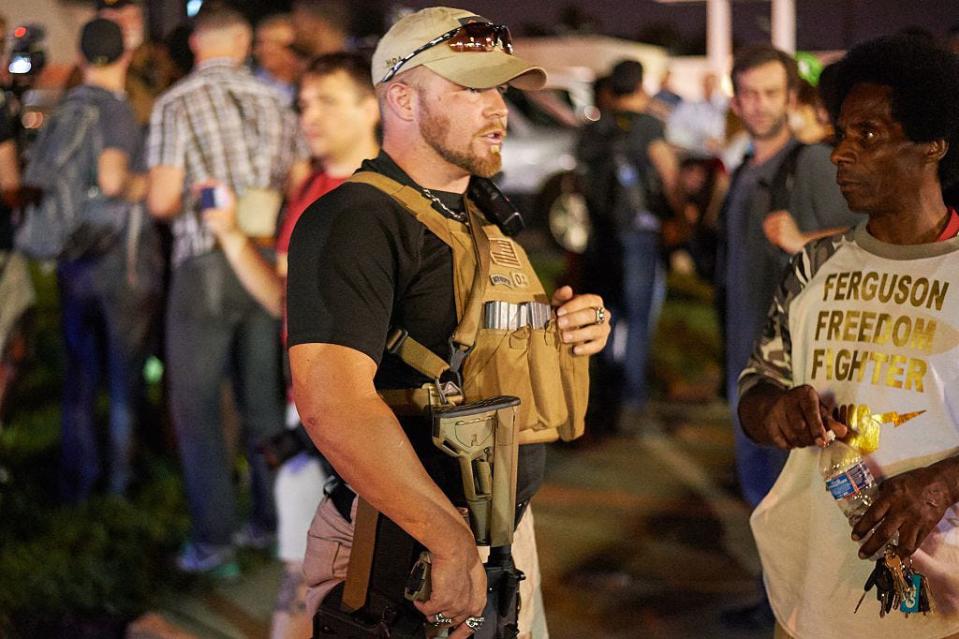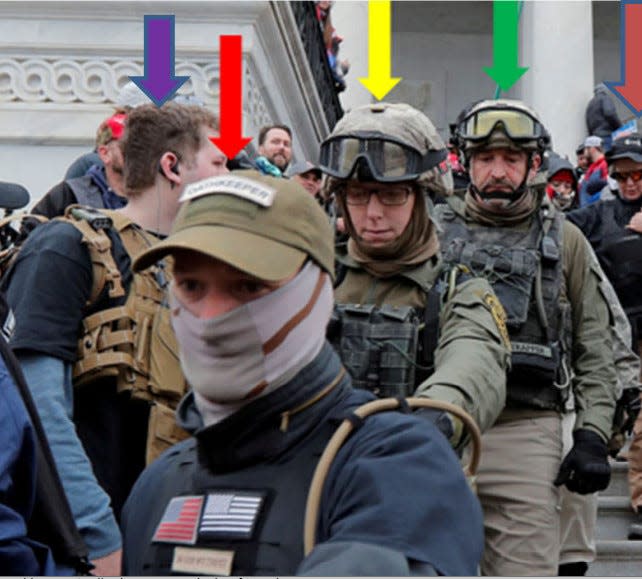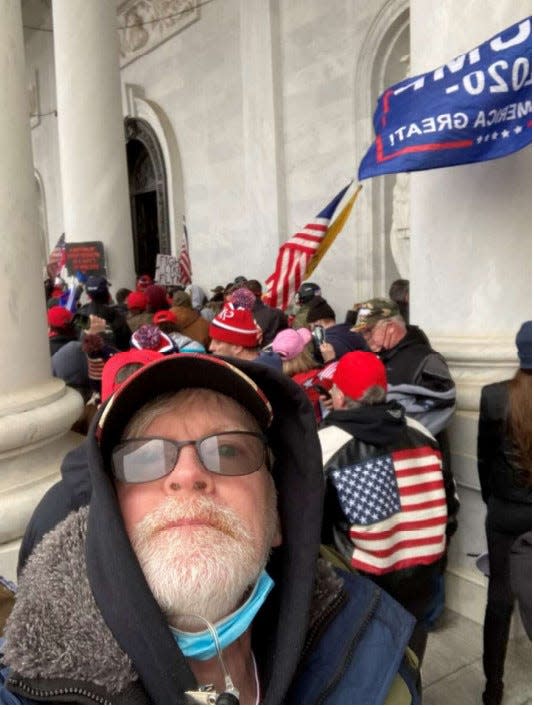They were trusted to train law enforcement officers, but they were members of an anti-government militia group
A leaked list of people who signed up for the anti-government Oath Keepers group includes 65 who identified themselves as law enforcement trainers, an illustration of how extremist and conspiratorial ideologies have proliferated in police departments across the U.S.
The majority of the 65 trainers claimed to be military veterans, law enforcement officers or both, according to a USA TODAY review of the list, which purportedly provides names, addresses, phone numbers and email addresses of almost 40,000 members.
"The police officers that are trainers are like the best of the best in their fields," said Daryl Johnson, a former senior analyst for domestic terrorism at the Department of Homeland Security. "You have people who are in these positions of influence. ... The fact that they're an Oath Keeper and a trainer would carry more weight for recruitment purposes."
Since its founding in 2009, the Oath Keepers has traded in warped interpretations of the U.S. Constitution. The group, which is part of what extremism experts call the militia movement, has recruited current and former members of law enforcement and the military.
Its members declare they will not enforce any government order they believe to be illegal, such as disarming Americans. The group has always had ties to white supremacists, but in recent years, it has spouted more anti-Muslim and anti-immigrant rhetoric.

Members of the Oath Keepers have engaged in high-profile armed standoffs against the federal government. Other members face conspiracy charges in the insurrection at the U.S. Capitol on Jan. 6, which injured about 140 police officers. One died a day later after suffering two strokes.
Law enforcement trainers have a broader reach than patrol officers or even supervisors, said Val Van Brocklin, a national police trainer. Trainers shape rookies’ minds and can imprint their view of police culture and tactics onto their students, she said.
Although tactical trainers may be less likely to talk about their personal views if they aren't teaching about laws or the First Amendment, she said, "I don’t think anyone can go through a training of mine and not recognize I’m a feminist."
With no national standards or curricula for policing, instructors in many states have the leeway to improvise, peppering in commentary and anecdotes.
'71 gets a gun': Graduates of Washington's police training academy unprepared to patrol streets, law enforcement leaders say
"It's concerning that you have that mentality among the elite of the police," Johnson said. Belief in the Oath Keepers' ideology can lead to a "training blind spot" for their students, he said, in which trainers are less likely to teach that armed white people can be threats.
Officers say they were attracted to group's pledge to defend the Constitution
Pittsburgh police Lt. Philip Mercurio described himself as a firearms instructor on the Oath Keepers sign-up form, writing that he "will spread the word to my students." He hung up on a USA TODAY reporter and did not reply to messages seeking comment.
Thursday, after learning about Mercurio's Oath Keepers tie, the Pittsburgh Bureau of Police put him on administrative assignment pending the outcome of a city investigation, said bureau spokesperson Cara Cruz.
Daniel Blackford, a former Secret Service agent and investigator who protected Presidents Bill Clinton and George W. Bush, wrote on the form that he had been an instructor for more than 10 years, teaching tactics, firearms and driving.
Blackford told USA TODAY he signed up while working at the U.S. Postal Service's inspector general's office, where he conducted training on firearms. An early member of the tea party, he said he joined the Oath Keepers early because of the group's oath to support and defend the Constitution.
Eventually, he said, the group grew too radical for him, and he started marking its emails as junk.
"I've sent them to my spam folder for so long, I don't know if they're still around," said Blackford, director of the police academy at the College of the Mainland near Galveston, Texas.

Experts said that although the group has evolved over the years, it has always been extremist and always posed a conflict of interest for law enforcement officers, who take their own oaths.
'I don't trust the government'
Of the 65 people on the Oath Keepers list who claimed to be law enforcement trainers, USA TODAY confirmed 21 by speaking to them or their employers or reviewing online records. Most people on the list did not respond to phone calls, emails or text messages. Some hung up. One sent a text message saying, "Lose this number."
Scott McDaniel, 42, of Lexington, Kentucky, said joining the Oath Keepers about a decade ago was initially a positive experience. He said he could get behind the group's message, like when when he joined the Three Percenters, an unauthorized militia named for the discredited claim that only 3% of Americans took up arms against the British.
Then, he said, "things started getting really hairy," and he left after a year or so.
"I don't trust the government after being in the military and then working for the government for so long," said McDaniel, a former U.S. Marine who is a federal corrections officer.
McDaniel said he has trained law enforcement since 2008, but he never talks about his views with trainees except perhaps over a couple of beers afterward. He said he never thought about a possible battle for allegiance between the oath he swore as an Oath Keeper and the one for law enforcement.
"As law enforcement, I never really even looked at the oath I took," McDaniel said. "You kind of just do it. You never really process it, especially at a younger age."
Though all individuals have First Amendment rights, the Supreme Court has held that police officers agree through their employment to limitations on what they can say and with whom they can associate.
Police "are armed government agents with the power to arrest (and) often kill with impunity," said Jared Keenan, a senior staff attorney for the American Civil Liberties Union of Arizona. They're people "who will, by definition of their job, interject themselves into many, many people's lives," from all backgrounds and races.
Extremist groups can learn tradecraft from law enforcement officers
Detective James Dana, a terrorism liaison officer for the police department in Gilbert, Arizona, wrote on his Oath Keepers sign up-form, "NOT SURE WHAT YOU'RE LOOKING FOR. ALWAYS WILLING TO HELP IF I CAN." He noted that he was a police trainer and supervisor.
Dana, a former U.S. Marine, did not respond to requests for comment. A representative for the Arizona Peace Officers Standards and Training confirmed that Dana fulfilled training to be a "general instructor."
Brenda Carrasco, a Gilbert Police Department spokesperson, told USA TODAY in an email that Dana learned about the Oath Keepers site in 2009 because "he believed he would be able to keep in touch with Marine Corps colleagues." She said he lost interest because it wasn't the best avenue to do that.
Carrasco said Dana has no contact or affiliation with the Oath Keepers now.
One problem, Keenan said, is that a terrorism liaison officer who subscribes to Oath Keeper ideology is likely to view actions by certain nonwhite people as terrorism, but not the same actions by a white person.
In the post-9/11 world, terrorism liaison officers can become privy to sensitive information. "There's a potential for a lot of tradecraft secrets and tactics that police use being linked and given to the adversaries," Johnson said.
On his LinkedIn page, Dana described his role as a link to the Arizona Counter Terrorism Information Center, federal, state and local law enforcement entities and the community.
"That's ironic," said Michael German, a former FBI agent and fellow with the Brennan Center for Justice.
German said the FBI has long trained agents that when investigating militia groups and other extremists, the subjects of the investigation often will have active links to law enforcement officers. German said agents are trained to modify their tactics to deal with that.

In October, The Arizona Republic obtained training materials from the state's Department of Corrections that were created for its special operations units, which have a history of excessive brutality against prisoners. Experts said the logo of a skull, knife, lightning bolt and crossed shotguns were similar to gang and white supremacist symbols.
The list of people who signed up for the Oath Keepers was obtained in a hack of its website; some of the files were made available to journalists by the whistleblower group Distributed Denial of Secrets. The list, which appears to go back years, gives no indication of how long people were with the group.
USA TODAY searched that list to find more than 200 people who identified themselves as active or retired law enforcement officers when signing up.
The number of police trainers on the list is likely an undercount. Most officers would know not to include their agency or identifiable details, given that law enforcement frequently gains access to that type of data, German said.
"The fact that there are so many that actually put their name on ... highlights how this kind of activity is tolerated within law enforcement," German said. But "the police don’t get to decide what laws should be enforced and what laws shouldn’t."
Tami Abdollah is a USA TODAY national correspondent covering inequities in the criminal justice system, send tips via direct message @latams or email tami(at)usatoday.com
This article originally appeared on USA TODAY: Oath Keepers hack includes police trainers on membership list

